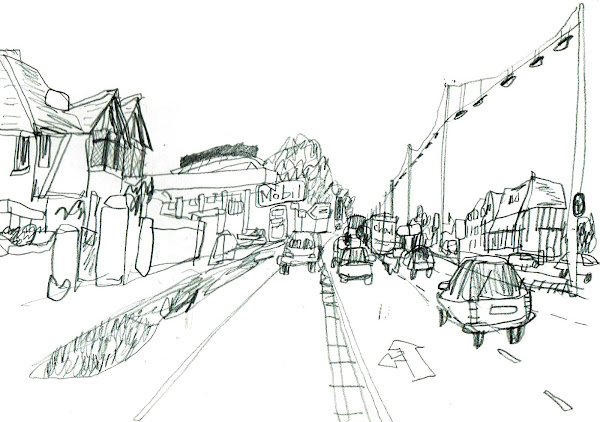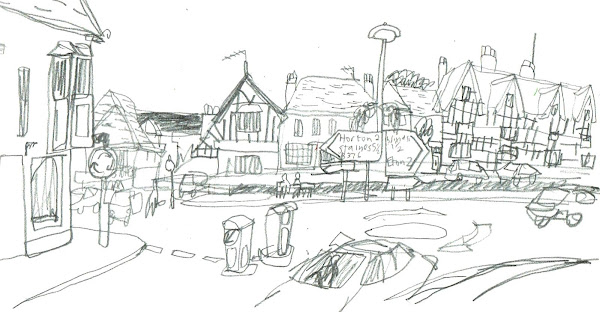 |
| James Hobbs, A40, West out London, 1990 |
Read an introduction to my journey, which started 30 years ago today, here.
[Bracketed sections like this have been added in 2020.]
It is hard to know quite where London ends now. Even when you think you have finally escaped it, reminders sneak through. It seeps undetected well past the outer membrane of the M25 into towns beyond, its influence unmistakable. The skies are hardly ever silent to the sounds of aircraft nor the fields to some dual-carriageway or another. Heading west, the greener expanses are undeveloped plots rather than pasture, a padding of cotton wool around Heathrow.
Everything is built for speed and everyone is straining for more. "We can be out of London in an hour," people say, not mentioning the dangers this entails, the jumped lights, the rubber burned into the tarmac. At 50mph, I am the slowest. Black taxis rush to the airport, and business people bored with travel sit reading in the back seat. The City and Heathrow are London to them. Holding onto my shaking steering wheel I want to catch their eye and laugh.
I pass beneath a gridlocked M25, queues of sales reps held ransom so they have to rearrange appointments on their carphones, lorry drivers leafing through tabloids snatched from their dashboards. A scrap metal yard of stacked rusted cars in the shadow of the motorway is just another lost irony.
Suddenly I'm not quite sure why I am doing this. After all the delays it is a surprise to find myself on the road. The van is perhaps something of a joke, a pocket dormobile that often squeezes smiles out of people when they see it. A Volkswagen would be more serious, proof of a greater dedication to a nomadic lifestyle. This little 1972 Fiat, for all the wonders of Italian design, is not exciting or glamorous. It has the aerodynamics of a brick. Signs of rust are reappearing already through the recently sprayed white paint. The man who sold it to me from his home in the shadow of the Hinkley Point Power Station had smiled too much perhaps as we agreed a price.
"The wife and I were going to have our summer holidays in it," he had said, "but – but we've different plans now." He didn't expand on this and I didn't dare ask. It looked to me that he'd bought it cheap, had done it up and was selling it quickly to some mug at a profit.
 |
| Good for six months (nearly): the Fiat 850T |
I took a friend along to check it over before I bought it. Chris claims to know Something About Engines and so I watched him slide underneath it with a grimace while I kicked the tyres purposefully and checked that the gas rings worked.
Inside there are a hundred bolted flaps hiding storage spaces, a table that emerges from the kitchen to make it a dining room from which unfolds a mattress to turn it to a bedroom. The roof unbuckles and concertinas up in a red and white striped canvas so it is nearly but not quite possible to stand up straight. From the roof a strange uncomfortable hammock comes out, a precarious pretence of a second bed. A tap pumps water up from a plastic container stowed away in a cupboard. Brown curtains with poppers seal the inside from the outside world.
 |
| The "kitchen" |
Before Chris has wriggled back out from underneath I know it's exactly what I want. It didn't really matter what he was going to say.
"Hey, this is it," I tell him. "I'll offer him £850."
"James," he goes, "let me take you home now at great speed because this machine here can only be a source of sweet anguish and possibly eternal misery for whoever owns it."
I consider it. "OK, OK. I'll try £825."
It's true: later, there are problems. It will need a new water pump, not an easy thing to find for this model. In the weeks I wait for one to arrive, I practice packing in everything I need to take and then take it all out again, much to the amusement of the neighbours. I try a few short runs to camp overnight in the hills on the Welsh side of the Severn Bridge. The bed seems unnecessarily fiddly to assemble and takes up all the space inside the van once it is up. It needs to be made and unmade while still in it, a skill not easily acquired. The whole operation seems so time consuming I wonder if it's even worth my while going away.
It is the middle of April [1990]. I have the van booked for a service at a little local garage before I set out. I have given up on waiting for the water pump. The old one will last a little longer before it completely disintegrates. People have started saying to me "Haven't you gone yet?" each time I see them. The service goes reasonably well but before I can leave it needs a new brake light switch. They say this will be quicker to get than the water pump, but may be several days before it arrives from Warrington.
 |
| My late brother Dave: it looks like he knew what he was doing, and he probably did |
Then I get flu, and spend days lying on the sofa wishing for an early death. [Thirty years on I did again, Covid-19, and wished for nothing more than a long life.] By this time a few people are even beginning to ask if I'm back already. The boxes are packed in my room waiting to be loaded in to the van at a moment's notice, and I start to eat the food I've packed into shoeboxes to take on the trip. There is a photograph of Hadrian's Wall in the paper one of these days. Right then, I couldn't envisage reaching London, let alone that remote outpost.
But then, and it's odd just how much of a surprise it comes as considering how long I've been waiting and expecting it, news comes from the garage that the switch has arrived and they can fit it straight away. Immediately I feel fit and well and ready to go.
I have a pile of sketchbooks and pencils, Morton's book and a road atlas. I have packed the provisions of a round-the-world yachtsman. I have a Shell Guide to England that can help me distinguish between what comes from the 13th century and what from the 14th century, but should the van collapse tomorrow it will all be over. On a budget of £40 a week there isn't too much scope for disaster.
 |
| James Hobbs, Datchet roundabout, 1990 |
The faster we can travel the further London spreads. Through Windsor where a crowd is gathered around the lights of a film crew shooting outside the castle, and Datchet where the green embossed with mini-roundabouts is overlooked by estate agents and antique dealers. The churchyard is shady and calm, and a woman passes by on her wicker-basketed bicycle as I draw, but the planes still rumble away and we may as well still be in London.
James Hobbs, 1990
Next: Bucklebury, Combe Gibbet and the RAC

No comments:
Post a Comment